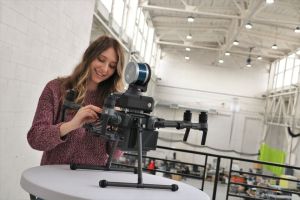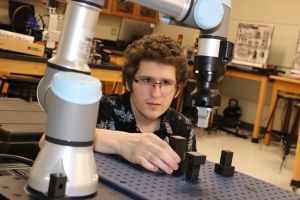Mapping the Future of Robotics Engineering

Robots have become part of our everyday lives. From home delivery and self-driving cars, to the Roomba vacuum and Amazon’s Alexa, they no longer exist within the confines of futuristic science fiction depicted in the artificially intelligent machines of Transformers or The Jetsons.
As robotics continue to integrate with human life, technology that is fueling the innovations has expanded beyond select industries, such as manufacturing and health care -- where robotic tools are long established. Today, robotics are contributing to and impacting a wide spectrum of businesses with advanced technology capabilities.
And as the industry continues to grow, so does the need for a skilled workforce.
Undergraduate robotics engineering students are getting early hands-on introductions to this cutting-edge industry through robotics-specific co-ops at area firms that are shaping the future of the field.
Sophomore robotics engineering student Taylor Kohnow is learning how to improve the function and performance of autonomous drones at Exyn Technologies. A leading robotics start-up located in Philadelphia, Exyn develops autonomous drones capable of identifying their surroundings and navigating independently to gather information for “digitally starved industries” such as mining and public transportation.
I love all aspects of robotics and I’m learning a lot about what I want to do in my career from this experience.
–Taylor Kohnow '22
The co-op program offered through the Office of Career Design and Development partners with students to secure positions with companies and organizations related to their fields of study for four or eight months.
Kelly Tierney, assistant director of Experiential Learning, describes the co-op experience as a two-way street that allows students to apply textbook lessons to an industry setting and bring real-world knowledge back to the classroom.
"Getting that hands-on experience and taking what they learned in the classroom, or even what they haven’t learned yet, and seeing it in the real world helps what students are learning in the classroom click and feel real,” Tierney said.
Throughout her co-op this semester, Kohnow has worked alongside a team of hardware engineers and technicians to assess and improve these independently operated drones using computer software to design and print 3D models for testing. She even accompanied the team to a client visit out-of-state to test run the aerial robots on-site in the mines.
“Everything is very hands-on, so I’m learning a lot of things from them that can only be learned through experience and not classroom learning,” Kohnow said.
For Michael Savarese, a fellow sophomore robotics engineering student, gaining industry-level experience while graduating in four years equips him with the advantage he needs to stand out in the job market.
The amount of experience and knowledge that you get out of a co-op within a shorter timeframe is a big positive.
–Michael Savarese '22
Savarese is gaining that experience and knowledge at Greene, Tweed, a manufacturing company that uses robotics automation to engineer custom-designed materials and components for clients around the world. This semester, Savarese has been tasked with researching and developing an automated process to sanitize production equipment, a traditionally manual and lengthy process.
His time at Greene, Tweed has allowed Savarese to utilize and expand his programming knowledge as well as present an overview of his research and findings to company executives, an unusual opportunity for a co-op student, yet alone a sophomore.
Spending time in the industry also underscores the importance of networking with like-minded professionals, an exercise that Savarese credits for giving him “a better sense of what industrial robotics and industry-level robotics looks like.”
As his co-op comes to a close, Savarese will return to campus with a deeper knowledge of robotics engineering, a network of connections that help put him on an inside track to career success, and a vision for his role as a future industry professional.
“I now have a reference of what it’s like in a real-life working environment,” Savarese added. “Co-op really lets you see what works for you.”
Co-op & Internship Opportunities Explore Robotics Engineering




